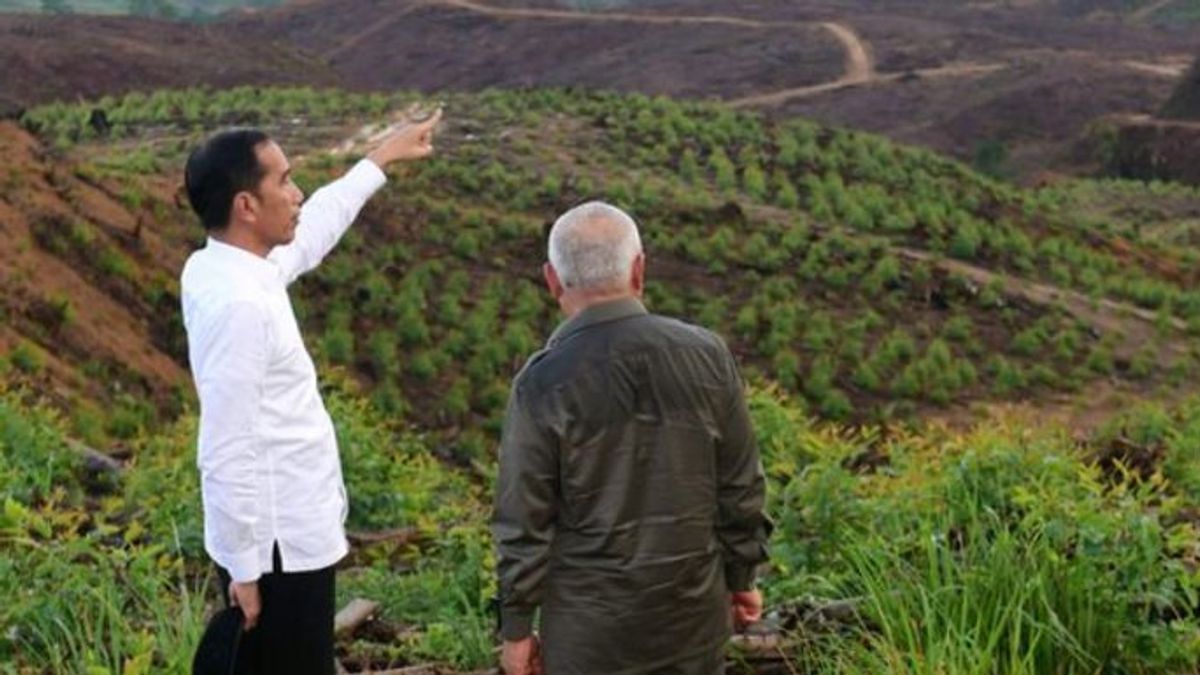Indonesia is not the only one planning to move the nation's capital city in the millennial era. Egypt did so too, moving the nation's capital from Cairo to a new city located 50 km east of the old capital.
In 2015 President Abdel Fattah el-Sisi announced that Cairo as the administrative center of the country would be moved to what was called the New Administrative City. The relocation of the capital was originally scheduled for early 2021, but due to the pandemic the plan was postponed.
Quoted by Egypt Today, Bassam Rady, who is the spokesman for the President, said that El-Sisi had instructed that the design of the new capital reflect a modern city. The construction of the new Egyptian capital was carried out by the Technical Authority of the Egyptian Armed Forces.
Al-Monitor news site said the relocation of the Egyptian capital cost a budget of 60 billion US dollars, or around Rp. 863.2 trillion. The total land used for the capital of the new state of Egypt is 697.9 km2.

The area is designed to accommodate 6.5 million inhabitants. The initial phase of the relocation will take up an area of 161.8 km2. The land area will be used for government offices, business areas, and diplomatic areas.
The appointment of the Technical Authority of the Armed Forces to be in charge of the construction of Egypt's new capital has sparked accusations from the opposition that the project is a land of glaring corruption and a political showcase for President El-Sisi.
Critics say the construction of the new city is simply "El-Sisi's vanity project". Other critics have argued that the yet-to-be-named New Administrative City would only become a remote region exclusively for the rich Egyptians, leaving behind poverty in Cairo's sprawling slums.
"Moving the Egyptian capital Cairo is a violation of the constitution," Diaa el-Din Daoud, a member of the Egyptian Parliament, was quoted as saying by Al-Monitor.
According to Daoud, article 222 of the Egyptian Constitution states that “Cairo is the capital of the Arab Republic of Egypt”.
Moving the Capital of Indonesia
The plan to move the nation's capital city from Jakarta to a new city that is rumored to be called Nusantara in North Penajam Paser and Kutai Kartanegara, East Kalimantan also invites pros and cons. The problem is the same. There was a lot of fuss about everything, from the cheap rumors thrown up by politician Edy Mulyadi by calling the new area a "place for the genie to throw children away" to the plan to appoint Basuki Tjahaja Purnama alias Ahok as leader of Indonesia's new capital city.
The discourse of the new nation's capital city was taken seriously by President Joko Widodo (Jokowi) in 2019 in the annual session of the DPR/MPR. Jokowi said that the nation's capital would move to East Kalimantan. Jokowi conveyed a number of reasons that he felt were very urgent.
"I want to emphasize regarding the construction of a new capital city that our new capital is part of the massive transformation that we want to carry out," Jokowi said in his briefing broadcast on the Presidential Secretariat's YouTube.
"The construction of a new capital city is not merely a physical move of government offices. The main goal of development is to build a smart new city, a new city that is competitive at the global level, build a new locomotive for the transformation of our country towards an Indonesia based on innovation and technology," added Jokowi. .

According to data from the National Development Planning Agency (Bappenas) when the plan to relocate the nation's capital was launched in August 2019, the total area of government land that will be utilized for the new capital city is 180 thousand hectares, or 1800 km2. A total of 40 thousand hectares or the equivalent of 400 km2, will be the main area of the new capital.
The total budget needed for the construction of the new capital city, according to President Jokowi's presentation at the Indonesia-United Arab Emirates Investment Forum meeting in Dubai, United Arab Emirates on November 4, 2021, is US$35 billion or around Rp501 trillion. Referring to the State Capital Law (UU IKN) which was ratified by the DPR on January 18, 2022, the financing scheme for the new state capital comes from two sources, namely: the APBN and other legal sources in accordance with the provisions of the legislation (Article 24 paragraph 1 UU IKN).
Rejection Voice
There are many voices against the plan to move the nation's capital to Penajam, North Paser, East Kalimantan. The Indonesian Forum for the Environment (WALHI), for example, rejected the plan to move the new capital city on the grounds of environmental and social damage. According to the Director of WALHI East Kalimantan, Yohana Tiko, there are at least three problems related to moving the country's capital city.
The first is the potential for social conflict because the displacement of thousands of State Civil Apparatuses (ASN) is feared to push the population in 72 villages affected by the new state capital project. The second is the opportunity to clear corporate responsibility for mining, plantation, forestry, and other business concessions located in the area of the new capital city, which has resulted in environmental damage. The third is the threat to the carrying capacity of the environment which includes water management, climate change, flora and fauna, and pollution.

The KedaiKopi survey institute in December 2021 conducted a survey with the results that 61.9 percent of respondents refused to move the country's capital city. Of the total percentage, 38.3 percent did not agree without a reason, 18.4 percent refused because of the reason that the location was not strategic, 10.1 percent said that Jakarta was still very representative, 5.6 percent were worried that the transfer would make the national debt swell, and 4.7 percent argued that moving the nation's capital would change history.
"I see that this is a process and later how the socialization and the government or related stakeholders will provide a more detailed explanation to the public. Therefore, all children of the nation must be able to give the government time so that it can clearly explain the transfer of the national capital to East Kalimantan. One of the goals of moving the nation's capital is to build the identity of the Indonesian nation and strengthen its position in the eyes of the world. So we should avoid these pros and cons," said Deputy Chairperson of the MPR Lestari Moerdijat, as quoted by Antara.
Indonesia as a democratic country, it is common if the pros and cons of government decisions always appear. However, Lestari Moerdijat believes that the government already has strategic steps in place to implement the plan to relocate the country's capital city.
The English, Chinese, Japanese, Arabic, and French versions are automatically generated by the AI. So there may still be inaccuracies in translating, please always see Indonesian as our main language. (system supported by DigitalSiber.id)









